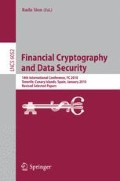Abstract
Reputation systems have become an increasingly important tool for highlighting quality information and filtering spam within online forums. However, the dependence of a user’s reputation on their history of activities seems to preclude any possibility of anonymity. We show that useful reputation information can, in fact, coexist with strong privacy guarantees. We introduce and formalize a novel cryptographic primitive we call signatures of reputation which supports monotonic measures of reputation in a completely anonymous setting. In our system, a user can express trust in others by voting for them, collect votes to build up her own reputation, and attach a proof of her reputation to any data she publishes, all while maintaining the unlinkability of her actions.
Access this chapter
Tax calculation will be finalised at checkout
Purchases are for personal use only
Preview
Unable to display preview. Download preview PDF.
References
Narayanan, A., Shmatikov, V.: Robust de-anonymization of large sparse datasets. In: IEEE Symposium on Security and Privacy (2008)
Backstrom, L., Dwork, C., Kleinberg, J.M.: Wherefore art thou r3579x? In: International World Wide Web Conference (2007)
Arrington, M.: AOL proudly releases massive amounts of user search data. In: TechCrunch News (August 2006)
Bethencourt, J., Shi, E., Song, D.: Signatures of reputation: Towards trust without identity, http://www.cs.berkeley.edu/~bethenco/sigrep-full.pdf
Steinbrecher, S.: Enhancing multilateral security in and by reputation systems. In: FIDIS/IFIP Internet Security and Privacy Summer School (September 2008)
Pingel, F., Steinbrecher, S.: Multilateral secure cross-community reputation systems for internet communities. In: Furnell, S.M., Katsikas, S.K., Lioy, A. (eds.) TrustBus 2008. LNCS, vol. 5185, pp. 69–78. Springer, Heidelberg (2008)
Steinbrecher, S.: Design options for privacy-respecting reputation systems within centralised internet communities. In: Intl. Information Sec. Conf, SEC (2006)
Belenkiy, M., Chase, M., Erway, C., Jannotti, J., Kupcu, A., Lysyanskaya, A., Rachlin, E.: Making p2p accountable without losing privacy. In: WPES (2007)
Camenisch, J., Hohenberger, S., Lysyanskaya, A.: Balancing accountability and privacy using e-cash. In: Security and Cryptography for Networks, SCN (2006)
Androulaki, E., Choi, S.G., Bellovin, S.M., Malkin, T.: Reputation systems for anonymous networks. In: Privacy Enhancing Technologies (2008)
Belenkiy, M., Camenisch, J., Chase, M., Kohlweiss, M., Lysyanskaya, A., Shacham, H.: Randomizable proofs and delegatable anonymous credentials. In: Halevi, S. (ed.) CRYPTO 2009. LNCS, vol. 5677, pp. 108–125. Springer, Heidelberg (2009)
Camenisch, J., Kohlweiss, M., Soriente, C.: An accumulator based on bilinear maps and efficient revocation for anonymous credentials. In: PKC (2009)
Belenkiy, M., Chase, M., Kohlweiss, M., Lysyanskaya, A.: Non-interactive anonymous credentials. In: TCC (2008)
Groth, J.: Non-interactive zero-knowledge arguments for voting. In: Ioannidis, J., Keromytis, A.D., Yung, M. (eds.) ACNS 2005. LNCS, vol. 3531, pp. 467–482. Springer, Heidelberg (2005)
Gennaro, R., Jarecki, S., Krawczyk, H., Rabin, T.: Secure distributed key generation for discrete-log based cryptosystems. In: Stern, J. (ed.) EUROCRYPT 1999. LNCS, vol. 1592, p. 295. Springer, Heidelberg (1999)
Groth, J., Sahai, A.: Efficient non-interactive proof systems for bilinear groups. In: Smart, N.P. (ed.) EUROCRYPT 2008. LNCS, vol. 4965, pp. 415–432. Springer, Heidelberg (2008)
Author information
Authors and Affiliations
Editor information
Editors and Affiliations
Rights and permissions
Copyright information
© 2010 Springer-Verlag Berlin Heidelberg
About this paper
Cite this paper
Bethencourt, J., Shi, E., Song, D. (2010). Signatures of Reputation . In: Sion, R. (eds) Financial Cryptography and Data Security. FC 2010. Lecture Notes in Computer Science, vol 6052. Springer, Berlin, Heidelberg. https://doi.org/10.1007/978-3-642-14577-3_35
Download citation
DOI: https://doi.org/10.1007/978-3-642-14577-3_35
Publisher Name: Springer, Berlin, Heidelberg
Print ISBN: 978-3-642-14576-6
Online ISBN: 978-3-642-14577-3
eBook Packages: Computer ScienceComputer Science (R0)

